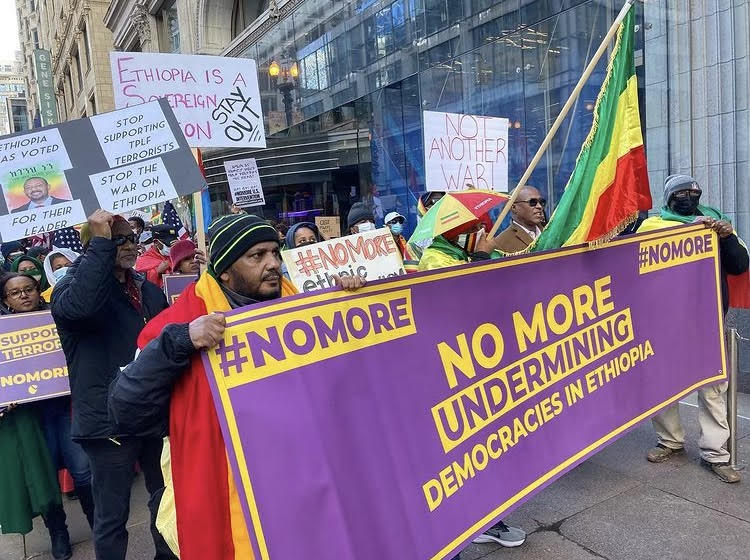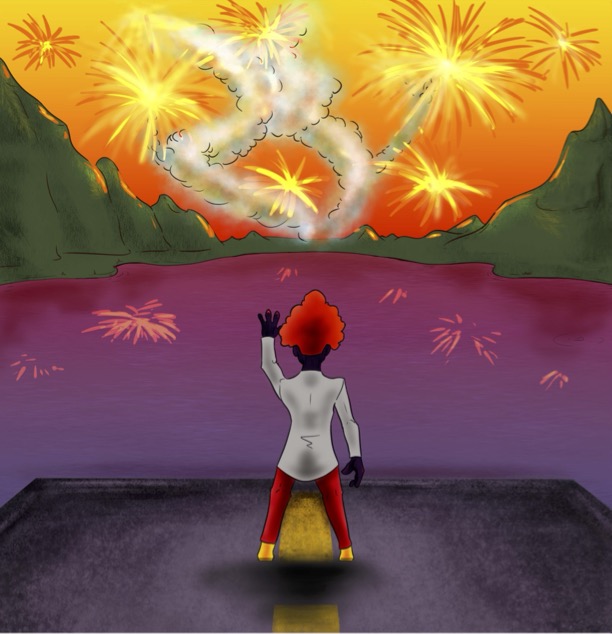Just as Chicago’s Ukrainians have reacted with alarm and dismay at the Russian invasion of their homeland, so have Chicago’s Ethiopians and Eritreans as they closely watch events in the Horn of Africa. Fighting there has left thousands dead and famine is looming.
The spark that lit the fuse of the current conflict was when the Tigrayan regional government held parliamentary elections in September 2020 in defiance of an order postponing them issued by Abiy Ahmed, the head of the Ethiopian federal government. Similar to the Kremlin’s tactics in the lead-up to the invasion of Ukraine, Ahmed and his generals massed troops near the northern Tigray region’s borders and flew military supplies to Ethiopia’s neighboring ally Eritrea. Soldiers from the Tigray People’s Liberation Front (TPLF) struck first, attacking a federal military base, after which Ethiopian and Eritrean troops countered with a two-pronged offensive from the north and south. The tide of the conflict has swung back and forth since, and fighting drags on to this day.
Historically, Ethiopians and Eritreans in Chicago have organized around providing support, language classes, and other services for recent refugees and immigrants. The community also created a cultural museum on the North side, and the Ethiopian Orthodox Church on the Southeast Side.

Aviva Levine is an organizer from the Chicago chapter of Act Now to Stop War and End Racism (ANSWER) who helped organize a protest downtown last fall. She said the central belief animating the protest was “that every country in the Horn of Africa deserves the right to determine their own destiny, and if a government is deemed illegitimate, it should be the right of the people of that country, and not the United States, to determine or to meddle in that.” The specific goal was an end to American sanctions on countries in the region, which Levine said have had a destabilizing effect. The protest brought more than 500 people, among them not only Ethiopian, Eritrean, and Somali Americans but also Black, Latinx, and white folks with no immediate ties to the Horn of Africa who showed up in solidarity with the cause.
Many in the Eritrean diaspora, even those in the United States, remain fearful of speaking out against that nation’s government. “People are traumatized. They wouldn’t want to say anything negative,” said Simon Aman, who was born in Asmara, Eritrea’s capital.
In 1998, when Asman was already a lecturer at Asmara University, he came to the United States to pursue a master’s degree in mathematics and statistics at Southern Illinois University (SIU). A border war between Eritrea and Ethiopia that would last more than two years and result in close to 500,000 deaths prevented him from returning, so Aman stayed on at SIU for a Ph.D. After a stint teaching at Florida Atlantic University, Aman returned to Illinois for a position at Truman College in Uptown, the place he has called home for the past fifteen years.
In 1973, when Aman was born, Eritrea was not an independent country. Just one year after his birth, Haile Selassie, the long-time emperor of Ethiopia, was overthrown in a coup and replaced by a Marxist military dictatorship. As a young boy, Aman survived a terrible famine that was caused by a historic drought and killed nearly a million people. Eastern and Western bloc countries, who were adversaries during the Cold War, both airlifted pallets of food across Ethiopia, a country nearly two times the size of Texas with the second-largest population in Africa.
When Aman was still a young man in 1991, fighters from the Eritrean People’s Liberation Front (EPLF) defeated the Ethiopian army and took control of Eritrea, a funnel-shaped territory hemmed in by the Red Sea, Ethiopia, Djibouti, and Sudan. The little-known leader of that rebel group, Isaias Afwerki, ascended to the presidency in 1993 and ratified his country’s independence through a referendum that garnered ninety-nine percent of the population’s support. Afwerki has ruled the country ever since. In 2015, the United Nations accused his totalitarian regime of torture and human-rights violations.
Aman related the story of a friend he had not seen until a recent visit. The friend, a writer who worked primarily translating texts from English into Eritrean, was arrested out of the blue one day and thrown into a cramped cell with hardly enough space to stretch his legs. The cell was so dark that the only glimmer of light was from a keyhole in the door. Guards periodically pulled him from his tiny cell for interrogations in which he was pressured to confess to a crime he did not commit. The man was released after a year in prison, once the security services finally decided he could not have committed the crime of which he was suspected.
Afwerki’s government has justified repression and mandatory conscription into the armed services because of the unresolved border war with Ethiopia that began in the early 2000s. Not until 2018, after Abiy Ahmed was elected prime minister of Ethiopia, did the two countries strike a peace deal for which the newly minted leader was awarded the 2019 Nobel Peace Prize.
It was around this time that Aman and many other Eritreans across the United States began saying “Yiakl,” which means “enough is enough” in the Tigrinya language.
“It started through Facebook and YouTube,” Aman said. “It was a social movement at the beginning. But then we started to organize.” Eritreans met, discussed grievances, and traded political opinions in over forty U.S cities. A meeting in Washington, D.C. brought the local groups together and included dissidents who had been jailed by the regime. The event ultimately spurred the formation of Yiakl Chicago/Milwaukee in 2019.
Unlike Aman, who took a direct flight to America, many of Yiakl’s sixty members made their way out of Eritrea across treacherous land routes through Sudan and Libya before securing permission to come here, fleeing from war, famine, or forced military service. “There’s no future there, especially for the younger ones,” Aman said. “Before they finish high school, they leave their homes. They become the government’s property, and they don’t know when they will return. There is no payment. It’s called national service, but it is really like slavery.”
Since the beginning of the latest conflict, Yiakl Chicago/Milwaukee has been opposed to Eritrea’s involvement in Tigray. “The war is an internal situation in Ethiopia, it didn’t touch any Eritreans. But our president, because he wanted revenge, took our soldiers,” some as young as fifteen years old, and sent them to Tigray, Aman said. “We’ve been demonstrating, and we’ve been telling people that our organization is completely against the government’s [actions].”
When I asked Aman about the prospects for peace or the complete breakup of Ethiopia into ethnic republics, he initially struck an optimistic note. “The only way forward is for them to sit down and figure out their differences,” he said. “We have to live together, whether we look the same, whether we talk the same, whether we have different cultures.” But when asked if he thought reconciliation was likely, he became grim.
“The issue is that the leaders in that region of Africa don’t give up their seats for the sake of peace; once they get in, they will just do everything to stay there,” he said. “And that is going to be the cause if there’s any breakup, it’s going to be because the leaders wouldn’t want to give up their power…which is very saddening, because if you have many broken up states, then they will continue to fight.”
Max Blaisdell is an educator and basketball coach based in Hyde Park. He is originally from New York City and later served in Peace Corps Morocco. He last wrote about gun violence initiatives in Chicago.


good one – Avi Kerendian